Mar Musa: Monastic Weekend
Dripping sweat, I fetch full baskets from the steamy washroom downstairs. Wringing clothes until my hands cramp, I struggle to hang the soaking heavy sheets. But the sun is shining in the mountains today, the air is crisp, and we are all more than happy to get involved. When the opportunity to join the community at Deir Mar Musa al-Habashi comes along, spending vacation days doing laundry becomes enjoyable.
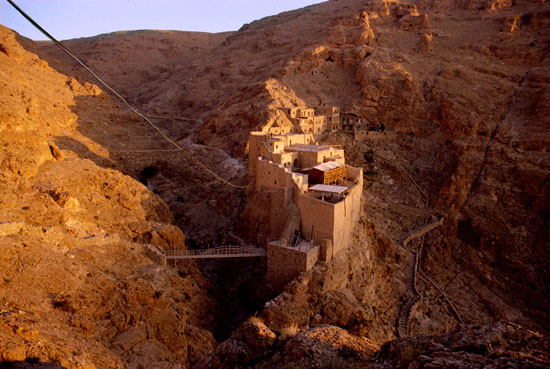
It's my third day at Mar Musa, and I'm already feeling ambivalent about leaving. The other travelers here boast open-ended schedules; since dropping into this community, they're in no hurry to leave. I'm in love with the people of the monastery and the desert mountain landscape, but I have only a couple weeks to explore Syria, and it's time to move on—after helping prepare our daily hot lunch.
I came to Syria without a guidebook, so I need travelers' recommendations. In Damascus, my American roommates suggest the monastery at Mar Musa as a highly worthwhile side trip. Only 80km north of Damas, it's easy to do as a day trip, but Christi and Tari were so charmed they came straight back to Al-Haramein, picked up their luggage, and returned for an overnight stay.
I'm quickly intrigued by the concept of this small community working to bring together Muslims and Christians in peace. The monastery welcomes all visitors, offering food and lodging and asking nothing in return. Our English roommate Becky is also interested. I like the idea of a travel partner, but I get bad vibes—Becky on one hand professes her love for small unique communities and on the other hand laughs derisively when Christi and Tari say most visitors happily volunteer to help with chores. The Beckster informs us that she'll be having a quick look around and the monks better accept it. Good times.
Getting to Mar Musa takes some work—the minibus only goes as far as the small town of An-Nebek. From here the driver charges another 200SYP for the bus to continue to Mar Musa, whether there are two passengers or twelve. Becky proceeds to announce the driver is ripping us off. Through gestures, the other passengers on the bus confirm we are going to Mar Musa. Becky takes it upon herself to translate—she assumes everyone is blatantly telling us the driver is a cheat. I remind her she doesn't know a single word of Arabic. She sulks.
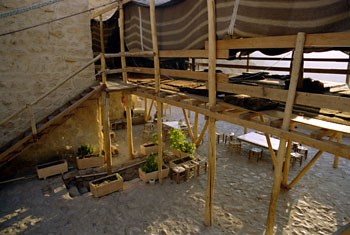 |
| Upstairs is a rest area, downstairs is for dining |
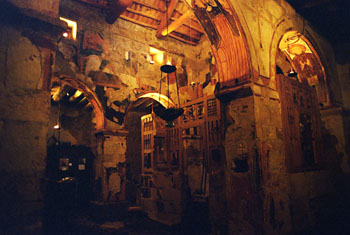 |
| The chapel |
Crouching, we enter through a low tunnel in the wall. On the other side, we encounter French people. It seems like there are always French people in places like this. The sole remaining monk is French, as well as three long-term residents. French daytrippers mill about.
The thousand-year-old monastery was abandoned at the end of the 19th century then rediscovered in 1982 by Jesuit priest Paolo dall'Oglio. Paolo established a small group of priests, nuns and monks here and now promotes an open dialogue between people of all religions. The site is a popular tourist attraction among Syrians, both Christians who come to visit the church and Muslims who are curious about the community.
Frederic the novice monk shows us the lovely small church. The floor is covered with kilims in the style of mosques, to put visiting Muslims at ease. The walls feature the remains of 11th and 12th century frescos. By coincidence, the frescoes on the side facing Mecca have been destroyed, so Muslims can comfortably pray in the chapel. Frederic displays an inordinate amount of Christian patience as Becky interrupts his guided tour with endless questions about Islam. I think I spot a hint of an eye roll but...nah, he's a monk.
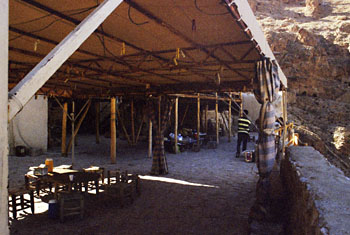 |
| The lounge area again |
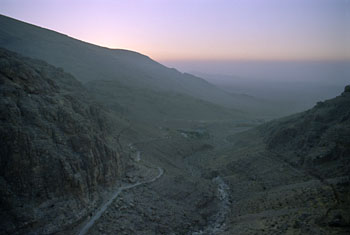 Sunset view |
Australian James and American Richard are quite at home here. After meeting in Damascus, they spent a week in Mar Musa and plan on at least one more. The relaxed mood really sucks a person in. They show me the ropes—chopping cucumbers, setting the tables and welcoming new visitors with tea.
Dutch Richard is also relatively long-term, having resided in a cave next to the men's dorm for three weeks. Dutch Richard works the hardest out of anyone, spending his mornings digging wells, hauling buckets of rocks, and feeding the goats, believing that work is the best way to pass the time. All three are escaping techie careers back home as computer scientists and engineers.
Each simple meal consists of flavorful locally-grown tomatoes and cucumbers, bread, olive oil, apricot jam, sweetened tahini and two kinds of cheese—one which comes from the monastery's own goats. The residents hope to sell the cheese to bring in a little extra cash. For lunch we also get a hot stew and rice, and whatever extras the day's visitors bring. Princess Becky won't wipe the tables or do the dishes but she does generously donate a box of exquisite pastries from Damascus.
At lunchtimes we mingle with visitors from a church in Hama and other foreign travelers. Tables burst with conversations in Arabic, English, and of course, French. Dinnertime brings on more serious discussions of philosophy, religion, the state of the Catholic Church and its future with the new pope. Mar Musa is not officially recognized by the Vatican at this point, but its residents pray and wait patiently.
Two services are held at 7AM and 7PM, conducted in French and Arabic by the multi-lingual Paolo. I attend one time, but after James and the Richards are put on the spot to participate, I am too self-conscious to attend another. When Paolo asks to hear their observations about the monastery the boys stammer unintelligibly, causing much merriment among the travelers later.
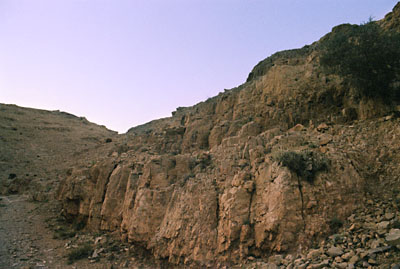 |
| The mountains surrounding Mar Musa |
I spend my afternoons getting Turkey tips from American Richard, playing with the monastery dogs, wandering alone on the mountainside and talking to Frederic about his previous life as an artist in France. In these times the visitation dies down and the atmosphere encourages quiet contemplation.
It's a fascinating place, totally beyond any of my expectations. Mar Musa provides an unusual break from hard traveling and leaves a lasting impression of generosity and love.